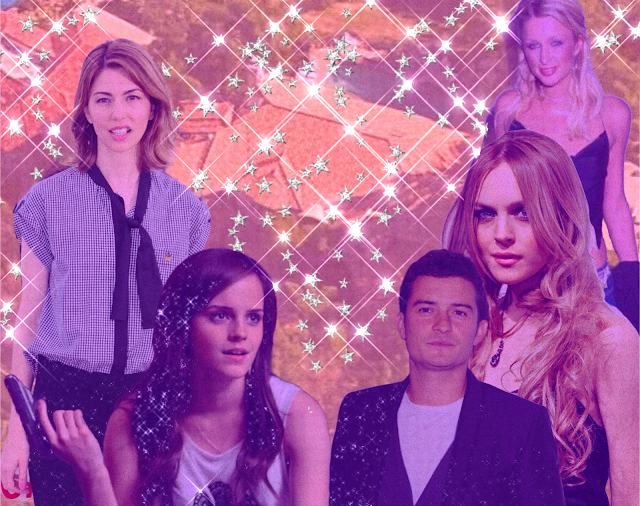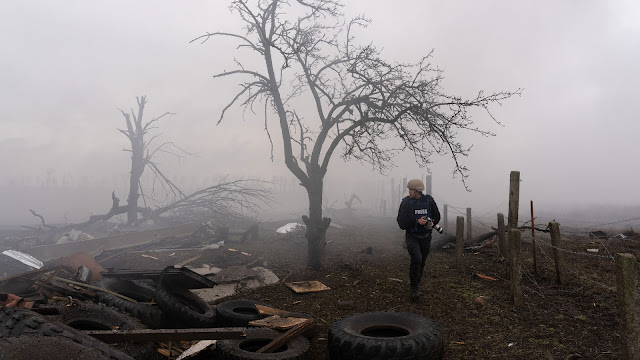The Bling Ring (2013) Was Not Good (and here's why)
by Morgan Stone
First off, I am so sorry Dr. Robert Sickels, I know that you really like Sofia Coppola. I know you are writing a book about her work, and I am very much looking forward to reading it. I don’t know that you are reading this article, but if you are, I am sorry. But The Bling Ring (2013) directed by Sofia Coppola is one of the most annoying movies I have seen, and it’s because it doesn’t understand its source material.
Now why am I writing about a movie from 2013 for the Y2k issue of Birdbath? Well, that has to do with it being based on real events from the 2000s.
The Bling Ring is based on the Hollywood Hills Burglaries, which was a string of robberies that took place in 2008/09 by a group of teens/young adults who began sneaking into unlocked celebrity houses and stealing clothing, jewelry, cash, decor, and at one point a glock. Primarily, they targeted Paris Hilton, and went into her house many times before she realized that she was being robbed and filed a report.
These kids were desperate for fame and deep in the party scene, spending most of their money on drugs and alcohol, and it’s estimated they robbed about $3 million throughout the course of their robberies, and many of their stolen items were fenced through Johnny Ajar, who was in an inappropriate relationship with one of the young girls.
It is estimated by some that they stole much more than what was recovered by authorities, and it’s possible they robbed more celebrities without them ever noticing. Part of the entire appeal of this story is that they were robbing people who owned so much that they couldn’t even tell they were being stolen from.
If you want to learn more about the real-life robberies, I highly recommend looking into articles published at the time, the new documentary on Netflix, or this video essay by Mila Tequila. Or you could watch the made-for-TV movie by the same name that tells the exact same story. I have a feeling both movies would have used the kids real names if it wasn't illegal, and I think there is an interesting angle you could delve here into what is legal and ethical when adapting real events.
The movie was based on a book that was based on an article that was based on a personal account of the robberies, and I think something got a bit lost in this game of telephone. According to some accounts, there’s just factual misinformation, which I don’t doubt. How would there not be? I personally can’t attest to that, and it doesn’t entirely matter because this is a fictional movie. But I can attest to why I don’t like this as an adaptation of the real burglaries.
This movie should hypothetically take place in 2008/09. Now, I maybe could have been convinced that the real-life story simply inspired the movie, and it was changed to fit in whatever time the director wanted, but decisions were made to keep a lot of factual information. The celebrities being out of town, Lindsay Lohan’s arrests, the literal footage of celebrities they used - these are things that did happen in real life, because they were directly adapted from the first-hand accounts. I mean, they even called the movie "The Bling Ring," it was very clear who and what this movie was about. Everything that happened in real life is essential to the movie’s plot.
It would have been a more time-consuming task for Sofia Coppola (and the rest of the creative team) to re-work this story to be a movie that takes place in 2013, or make it tactfully ambiguous and change it into an story all in its own. It would have been less work, but still some work, to ensure that this movie felt representative of 2008/09. Neither of these time-consuming tasks was breached. I can't help but feel it would have felt much stronger if tact was taking into narrowing in on when this movie is supposed to take place.
This movie ends with Frank Ocean’s “Super Rich Kids” playing, which don’t get me wrong is a great song, but you cannot convince me that it sounds like it was made in 2008. In 2008, Frank Ocean still hadn’t met Odd Future and was writing songs for other artists. It’s only about a 5-year difference, but there were many culture shifts, and the nuance of that would be like making a movie explicitly set in 1975, then seeing a poster for the first Star Wars hanging in the background. It’s these details that create the world that the film takes place in.
Reading an interview for Teen Vogue with the costume designer for this film boggles my mind. I cannot understand what happened here. Battat talks about this movie, and how it’s unclear whether or not it is a period piece. There’s ambiguity, so they incorporated that ambiguity into the fashion.
She quotes: “Is this a period movie, or is this not a period movie? This was a big conversation that me and Anne Ross, the production designer, had with Sofia. The final resolution was that we wanted to have Juicy sweatsuits, which are obviously not a thing now, but that it was also kind of impossible to make the movie in this day in age without iPhones and Twitter, which didn't exist in 2009 in the same capacity. The ways in which people can pry are just so much more advanced now, and it would be a shame to exclude that, but we also really wanted a Juicy sweatsuit, so we were a little ambiguous about time.”
Why? Why would it have been a shame to exclude communication of this day and age in a movie that talks about real people and real events that took place in the past in a very, very explicit manner? They barely even take advantage of "new social media," the tech is so inconsequential to what happens, because they instead use exactly what happened in real life. These kids in the movie literally use MySpace. And what would be so bad about making sure that the fashion wasn’t absolutely ugly? Yeah, 2000s fashion is ugly, but not in the way that the early 2010s had the tendency to be. Battat said they also were inspired by spending time downtown LA, and simply, they should not have. Everything looks ill-fitting and there's no cohesion, and you could maybe convince me of that stylistic choice to show the characters as immature and naive, but it doesn't feel tactful, which is important.
There are some looks in this movie that actually leave me at a loss for words. The story is (allegedly) trying to convince the viewers that these kids are obsessed with celebrities and want to live their lives, and you’re telling me that they would wear a lacy dress, that looks like something 15-year-old me would’ve worn to my brother’s graduation in 2016, when they go out to the club? There’s no way in hell!
These kids idolized Paris Hilton and Lindsay Lohan and would have been doing anything to dress like them. They could have been wearing cheap or ill-fitting versions of what those celebrities wore. Designer pieces sticking out like sore thumbs in a normal wardrobe. Battat talks about Juicy sweatsuits, but I can only name one time I saw one! We barely saw low rise jeans (which were wildly popular) and the color palette was so bland, puling mostly whites and grays.
I cannot justify this film’s decision to be both faithful to the story’s timeline and ambiguous in the same reach. I am certain that is a technique that can be done, and done well, but this film didn’t do that. It felt messy and, honestly, like there wasn’t a lot of care put into it. Sure, they changed character names, but didn’t do much to distinguish them from their real-life counterparts, and it, again, was so reliant on real events with set dates. Using real footage of the celebrities at the time. Re-creating literal webcam footage of one of the members to near exactness (which by the way was just randomly stuck in the middle of the film).
I would have enjoyed the film so much more if it chose an era and stuck with it. Maybe it couldn't be close to the real events legally, and that's fine, but then why try to use any of the factual information at all?
But forget all my nitpicking about the timeline and stylistic choices. You can make a case that this was a good decision, that I’m being annoying by pressing the aesthetic choices so hard, that it’s a piece of fiction and it can be whatever it wants. Of course it can.
But what really irks me at the end of the day is how these young people are portrayed. They’re portrayed as vapid, which is fine because, yes, they were. They were mostly rich kids who spent their time getting high and partying, but it just doesn’t get to the heart of what was happening. It tries, but it just doesn’t really encapsulate this intense desire to not just be famous, but be in the lives of these celebrities. It’s an interesting concept, and most people at one point or another have wanted a peek into what the world’s most famous do behind closed doors, and I think this feeling should be portrayed as a dark and innate desire, instead of the flippant desires of "those damn kids." This could’ve been delved into in an interesting way, and I wanted to see the desperation and curiosity that was driving these kids, not just a simple descriptor of “greed.” I just wanted it to be something more.
A lot of the dialogue focuses on explaining to the audience what’s happening (i.e., “they’re not sisters, they were just raised together” and “how long will you be in Nevada?”). Rather than explaining what was happening to the audience in this regard, the time should’ve been used delving into each character and their motivations. The characters were underdeveloped and felt like caricatures. The new kid at school who gets pulled into mischief. The bitchy ringleader girl. The stupid valley girl sisters. There was an opportunity to humanize these people who simply did criminal and stupid things. Audiences love when they can't help but sympathize with villains. But it all just feels vapid, and I’m not sure I have a better word to describe how the movie leaves me feeling. Maybe that was the intent, but I leave feeling that way about the film itself, not the actions of the kids.
The creative team talks about the greed and decadence of these kids, but it doesn’t feel like the production design even taps you on the shoulder, let alone hits you across the face with it. I want to see these characters at the end of the movie and visually see without a doubt that their style has changed to meld into their idols. And I want them to still be sympathetic, and show the desperation they felt for being famous. Their struggles with substance abuse.
The movie just feels like we are pointing and laughing at how stupid these kids were for robbing celebrity homes. Of course they were being stupid and criminal, but stating the obvious doesn’t make it into a compelling movie.
Oh yeah, and Emma Watson’s valley girl accent was horrendous.



Comments
Post a Comment